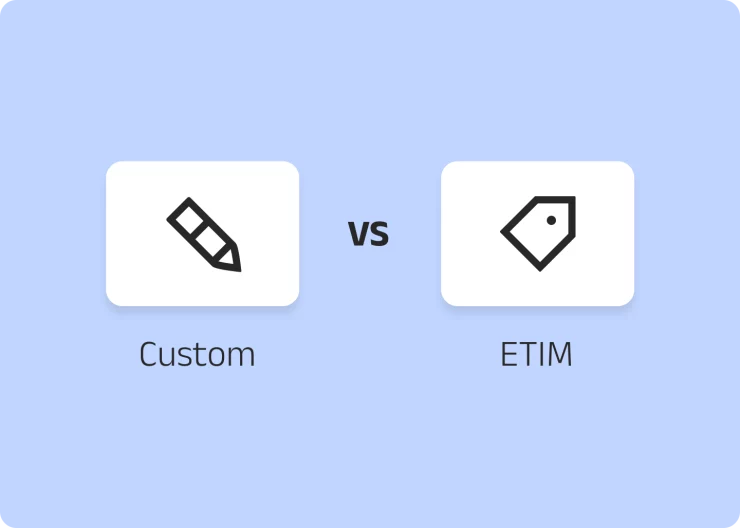Custom Classes
With Custom Classes, you can create your own attribute set. It can be described as a template with specification requirements that you can easily use for one or more product groups.

Custom vs. ETIM
For many customers and products, ETIM is the most suitable or sometimes even the only way to go when it comes to filling in product information. However, the hard requirements of ETIM are not always necessary and sometimes they are even insufficient. ETIM is exhaustive and very technical. Custom Classes can be set up entirely to your liking and are particularly suitable for "softer" classifications such as the color of a product or "suitable for".

Not a reader? No problem.
Give me a call and I'll explain our product to you in detail.
Do you want to see our product?
We'll give you a free demo. Inquire now without obligation.
- Integrated DAM system
- ETIM Classification
- Standard connection to data pools
Frequently asked questions about custom classes.
-
What does the abbreviation PIM mean
PIM stands for Product Information Management.
-
What is a PIM-system?
PIM stands for Product Information Management. A PIM system is used by organizations that want to manage and organize all relevant product and article information. No more hassle with Excel files, but an unambiguous, standardized system.
-
What does a PIM system do?
The PIM system collects and structures all product information in one central location from which it can be easily enriched and distributed.
-
Why do I need a PIM system?
A PIM system collects and structures all product information in one central location from where it can be easily enriched and distributed. No more hassle with Excel files, but an unambiguous, standardized, system. Read more about our PIM platform and its benefits here.
-
PIM system benefits?
- Work more efficiently and save time
Because product information only has to be entered once (and in one place), this saves a lot of time and makes the time-to-market faster. Moreover, all product information is stored in one central location, making it easier to consult. -
Increased conversion
The optimized (and correct!) product information increases the chance of a purchase. -
Better synergy between (E-commerce) systems
By linking to so-called data pools with millions of products (e.g. 2BA, InstallData and EZ-base), the PIM system is enriched with product information. -
Wondering what a PIM system can do for your company?
We have listed the advantages of a PIM system for you.
- Work more efficiently and save time
-
How much does a PIM system cost?
At Skwirrel, we offer three packages. Basic, Premium and Plus. Check out our pricing here.
-
Where are the attachments located?
Skwirrel offers a PIM system that integrates DAM. In Skwirrel, all product data can be stored and clearly managed. All attachments and assets are integrated. By working in one system the data is stored in one place and therefore always consistent.
-
What systems can I connect with?
The PIM system can be linked to your ERP system so that the basic product data from your ERP can be read into Skwirrel. Subsequently, the data in Skwirrel can be supplemented and further enriched. This data can be delivered from Skwirrel to your webshop or various data pools. Skwirrel gladly helps you to realize the links you want!
-
Where is my data stored?
Skwirrel operates with its own servers where your product data is stored.
-
Why should I choose Skwirrel?
Our PIM system aims to collect and structure all product information in one central location. No more hassle with multiple files with multiple versions in existence, but a single, standardized system. In the cloud, everywhere and always up-to-date. Schedule a free demo and get started in no time. Read more about our PIM system and its benefits here.
-
What data types does Custom classes support?
- Alphanumeric
- 1 question, 1 answer
- Multi-alphanumeric
- 1 question more than 1 answer possible
- Text
- up to 19K characters
- Big text
- HTML wysiwyg
- Range
- From ... to
- Boolean
- Yes / No
- Date
- Alphanumeric
-
How many internal links are available?
We have a solution for all common data problems. If yours isn’t listed, we will create it!
-
Are all data quality issues shown above my product?
No, we classify problems as low, medium, high, and critical, with critical issues always displayed at the top (until you resolve them).
-
What exactly is a virtual product?
Think of it as a placeholder for generic product information that you can use for a product group.
-
How do I create a virtual product?
It is a product that you simply mark as virtual and can use for grouped products.
-
1. Category management
The category tree structure from Skwirrel can be applied directly in Magento 2. Your products are automatically linked to one or more categories they belong to. This ensures that your products are available in your Magento shops with the correct structure and always with up-to-date information from Skwirrel.
-
2. Multilingual capabilities
Companies that present their shops in multiple languages or operate in other countries or markets gain enormous benefits from the integration between Skwirrel and Magento. Skwirrel makes it possible to manage multilingual descriptions, specification attributes, values, and SEO texts, and display them in almost any conceivable language. A functionality you simply cannot ignore.
-
3. File management
The integration ensures that images and other attachments linked to products in the PIM system are automatically available in Magento 2. Complete with visual content and other relevant files. All attachments are specified by type and category, making it easy to distinguish between different use cases. For example, between a certificate and a manual, or between a product image and an atmospheric photo. This creates a consistent and complete presentation of your products in your webshop.
-
4. Attribute sets and specifications
All detailed product information is accurately transferred from Skwirrel to Magento 2. Attribute sets and product specifications are clearly displayed in the webshop. This significantly improves the ability to find products through the shop’s search functionality.
-
How does the integration with our ERP system work?
Skwirrel develops all ERP connections in-house. This allows custom solutions to be delivered, efficient integration, and ensures that all business logic is applied correctly.
-
Is the ERP integration secure?
Yes. Our connections are developed with security in mind, including encrypted communication and authentication according to modern standards.
-
What if our ERP system is complex?
No problem. Skwirrel has experience with complex ERP structures and knows exactly where the data comes from and where it needs to go.
-
Are our business rules included in the integration?
Absolutely. We implement all relevant business logic in the connection, ensuring processes run smoothly and without errors.
-
Can we implement changes quickly?
Because we built the integration ourselves, we can respond quickly to adjustments in your processes or ERP system.
-
Do you support different ERP systems?
Yes. We have built integrations for SAP, Exact, Microsoft Dynamics, AFAS, and various custom systems.
-
Do we need to do any programming ourselves?
No, we handle all technical work. You provide the specifications, and we take care of the rest.
-
How do you know which data is important?
Our experience with product data and ERP logic ensures that we know exactly which source should be leading and which fields are crucial for your processes.
-
What if we use multiple systems at the same time?
This is not a problem. Skwirrel provides central management, allowing data from multiple sources to be combined and synchronized.
-
How long does it take to build an ERP integration?
It depends on the system, but since we handle everything in-house, we can often deliver a working integration within a few weeks.
-
Can files like PDF manuals also be sent to WooCommerce?
Yes, you can easily link files such as manuals, safety sheets, or datasheets (PDF, JPG, etc.) to products via Skwirrel. These are automatically pushed to WooCommerce.
-
Are changes to product data automatically synchronized with WooCommerce?
Yes, any updates you make in Skwirrel—such as price, stock, or descriptions—are automatically and instantly synced with WooCommerce.
-
Can multiple webshops be connected to a single Skwirrel environment?
Absolutely. Skwirrel supports multistore setups, allowing you to manage multiple WooCommerce shops from one central PIM environment.
-
Does the integration support variable products (such as sizes or colors)?
Yes, variable products and their variants are fully supported. You can manage them in Skwirrel and sync them to WooCommerce.
-
Is it possible to manage product categories and tags from within Skwirrel?
Yes, categories, tags, and other classifications can be managed in Skwirrel and included in the export to your webshop.
Discover more features of Skwirrel.
Experience what we can do for you? Contact us for information, advice and enthusiasm.







